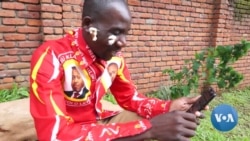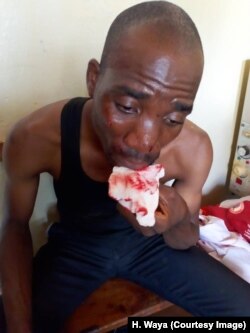Political violence is on the rise in Malawi as the country prepares for May elections.
The victims are mostly opposition party members beaten by suspected supporters of the ruling Democratic Progressive Party. However, DPP officials have denied being behind the attacks, blaming misguided youth who aim to tarnish the party’s image.
In response, Malawi’s electoral commission has threatened to disqualify any candidate using violence.
Mob of youths attack
One opposition party member, Henderson Waya, a member of the United Transformation Movement, was attacked by a group of youths two weeks ago when he and others were driving to a party rally.
He says when they youths approached them, one threatened to burn their car and threw a glass bottle at them. The bottle missed him by a whisker but hit the driver’s door. Waya was severely injured by the pieces of glass, which stuck in his face.
Waya says the mob declared only the ruling Democratic Progressive Party could hold rallies ahead of the May elections.
The attack came just days after suspected DPP youth beat UTM lawmaker Bon Kalindo.
“I have a broken nose, I had a clot in the head and this time, I am feeling some bodily pains, especially in the head because I was bleeding from nose and the mouth,” he said.
The ruling DPP denies they are behind the recent attacks, and President Peter Mutharika said political violence would not be tolerated.
Spokesman Nicholas Dausi went further: He told VOA the violent mobs were posing as DPP supporters to smear the party’s image.
Lack of ideas
But Malawi political analyst Sherrif Kaisi says violence is often the last resort for leaders who run out of ideas to win public support.
“If you run short of these [and] you don’t have what you can give to the people; you don’t have what you can explain to them about what you can do to be free from corruption. If you don’t have strategies of eradicating corruption, then you result to violence,” he said.
The United Nations says if not addressed, Malawi’s rising political violence could discourage voting.
Code of conduct
Malawi’s electoral commission announced that all presidential candidates must sign a code of conduct during campaigns.
Sangwani Mwafulirwa is the spokesperson for the electoral commission.
“It [code of conduct] focuses on campaign where people express ideas and not focusing on castigations or ferrying youths to stop other people’s rallies or any form of violence,” he said.
The commission says it will disqualify any candidate whose supporters use violence during Malawi’s official campaign period, expected to begin in March.
Even if enforced, that’s little comfort to opposition members like Waya.
It also means that Malawi could see weeks of more political violence before candidates need to worry about consequences.






